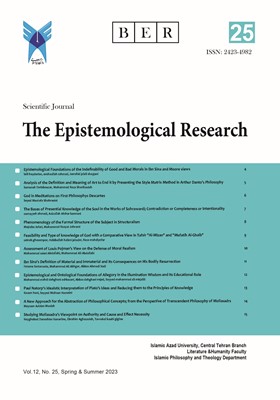Phenomenology of the Formal Structure of the Subject in Structuralism
Subject Areas : Epistemological researches
Mojtaba Jafari
1
![]() ,
Mohammad Raayat Jahromi
2
*
,
Mohammad Raayat Jahromi
2
*
1 - PH.D student in philosophy- Imam Khomeini International University
Faculty of Literature and Humanities Field of philosophy، Qazvin city, Iran
2 - Associate Professor in Philosophy, Imam Khomeini International University
Keywords: symbol, unconscious, Experience, Formal, Phantasy,
Abstract :
The formal structure of the subject is widely debated because "subject" is based on discrete of the "I / world" distinction, how can the formal structure remain stable without distinguishing between "this and that" by adding multiple concrete things? The subject, in the beginning, is only a space that gives the non-possibility to enter, it cannot be determined whether it is "the influence of the subject or the influence of the object" but in any case, it is a structure that opens the other Ideas to the "sensual matter" and figures the stage of alienation It enters a stage that is necessary for the "formal emergence of the subject." The subject is the “analytical continuation” of the notion that the basis of consciousness is not sought from any context and sometimes has an empty beginning. We lose the possibility of receiving consciousness naturally in such a way that the subject creates it only with the emergence and disappearance (the catalytic role of the subject). So "the subject is not historical and linguistic, because the natural connection and natural references are not related to history and language." It informs to the extent that "what does not become symbolic remains unconscious."
Eliade, M. (1959). The Sacred and the Profane: The Nature of Religion, Houghton Mifflin Harcourt.
Husserl, E., & Dahlstrom, D. O. (2014). Ideas for a Pure Phenomenology and Phenomenological Philosophy: First Book: General Introduction to Pure Phenomenology (Hackett Classics). Hackett Publishing Company, Inc.
Keck, F., & Debaene, V. (2009). Claude Lévi-Strauss: L’homme au regard éloigné (Littératures) (French Edition) (1 ed.). GALLIMARD.
Lacan, J., & Miller, J. A. (2004). The Four Fundamental Concepts of Psycho-Analysis. Routledge.
Lévi-Strauss, C. (1964). Le cru et le cuit (Mythologiques, v.1) (French Edition). Plon.
Lévi-Strauss, C. (2014). L’origine des manières de table (Mythologiques, v.3) (French Edition). Plon.
Lévi-Strauss, C. (2019). Anthropologie structurale (French Edition). Wentworth Press.
Roffe, J. (2020). The Works of Gilles Deleuze I: 1953–1969. re. press.
Welton, D. (1999). The Essential Husserl: Basic Writings in Transcendental Phenomenology (Studies in Continental Thought) (Illustrated ed.). Indiana University Press.
_||_
